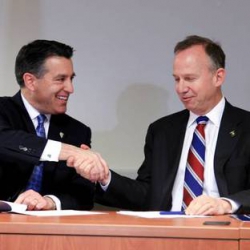Since Nevada and Delaware began sharing player pools, Delaware’s online poker revenues have increased. In each of the last three months, the Delaware Lottery’s financial reports have shown an increase in gaming revenues for the state’s three online poker sites.
April 2015 was the best month for online poker yet, which was an 11% increase over the previous month. March 2015’s $43,636 revenue stream was a 25% increase over the previous month, which itself was a 25% increase over the previous month. While the percentage boost in revenues lowered from month-to-month, that is bound to happen when total revenus begin to increase.
Revenues Still Small
Readers should be under no illusions that the Delaware gaming numbers are good, by industry standards. In New Jersey, the online poker revenues reach into the millions, not the tens of thousands. Even then, the totals are considered disappointing. Still, Delaware’s gaming figures are improving, which is a far cry better than could be said in the latter stages of 2014. In one month, the total gaming revenues were $1.
Delaware’s online poker players are now able to play against Nevada players, under terms of the Multi-State Internet Gaming Agreement (MSIGA). The MSIGA was signed by Delaware Governor Jack Markell and Nevada Governor Brian Sandoval in February 2014, but the pact only went into effect in late-March 2015.
Advantages of Multi-State Poker
The deal does several things for players in Delaware. One, the number of players online at any given time is now in the hundreds, and not the dozens, of players. Gamblers might be able to find the type of poker variant they want in the style of event they want and with the betting limits they prefer. Before only Texas hold’em was a viable gaming opportunity. High rollers and low rollers usually could not find a table open–limits were set for mid-range players. Also, everything was a turbo event, because not enough players existed online for bigger events.
Two, while Delaware rooms usually died down around 11 pm Eastern Time, those same tables are now active much later. When it’s 11 pm in Delaware, it is 8 pm in Nevada, so people with late schedules or late-night sleep habits can play when they want to play.
Sunday Jackpots Should Increase
Three, weekend jackpot events now become a possibility. The Sunday jackpot tournaments are likely never to be on the level with PokerStars and its rivals, but if a hundred players join an event, they can pool their resources and build up a better jackpot than before. Gamblers are drawn to events with the biggest jackpots, so more Delaware players are likely to sign up for tournaments on the weekends.
The advantages have been small, though, and one can expect to see them remain small in the near future. It would take another half-dozen to dozen US states to join the compact before online poker might attract large player pools. The multi-state compact not allows those two states to share gambler resources, but the compact allows for other states to join simply by agreeing to the principles of the treaty.
New Jersey Will Not Join
Only one other state has legal online sports gambling at present: New Jersey. It is a bigger state, with 2 & 1/2 times the population of Nevada and Delaware combined. For that reason, New Jersey’s leaders feel they do not have much to gain from signing the compact.
Several other states are considering legalization: Pennsylvania, California, Massachusetts, and Connecticut. Those states might sign a compact, but three of the four are among the more populous states. If their officials make the same calculations as New Jersey, they might not join a multi-state compact. Thus, for Delaware to see major advantages, then a number of states with medium to small populations need to legalize online gambling, then sign the compact. Mississippi, Indiana, and Washington all considered proposals this year, but none came close to approving online poker. For the time being, Delaware is going to need to be content with small, incremental increases.
Individual Revenues for Delaware’s Poker Sites
Among the three online poker sites in the state, Delaware Park remains the big success. The Stanton-based racetrack’s website had a net revenue of $34,591 in April 2015, which represents over 71% of the total revenue in the state. Dover Downs was next with a $10,675 net revenue for April 2015. Harrington Raceway & Casino was far behind its rivals, with just $3,286 from online poker in the month of April.
Readers should note that Delaware is slow in releasing its online gaming revenues, so April 2015 remains the latest report on the financials as of mid-June 2015. Hopefully, as gaming revenues increase, the Delaware Lottery will make releasing the totals a higher priority.

